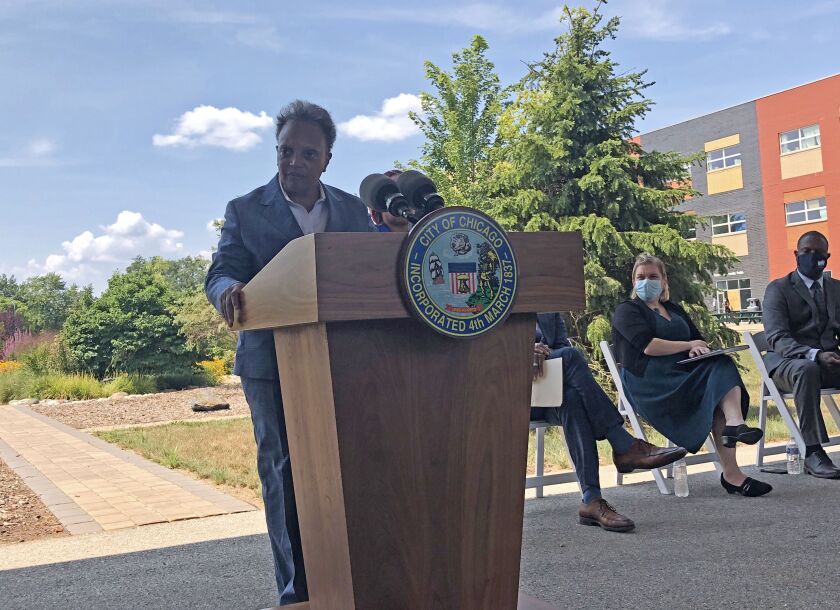An emotional Mayor Lori Lightfoot vowed Thursday to apply the same “hyper-local, data-driven” approach she used to deal with the coronavirus to wipe out the “pandemic of violence” plaguing Chicago.
When Lightfoot learned Black Chicagoans were dying from COVID-19 at seven times the rate of “any other demographic,” she knew she could not reveal those startling statistics without presenting “concrete solutions.”
She pushed her team to devise an intensive outreach plan to confront the disparity. Chicago’s “racial equity rapid response teams” were born.
Now, Lightfoot is using lessons learned and “infrastructure built” during the pandemic to combat a problem even more threatening to the city’s future: unrelenting gang violence and mass shootings that are robbing the city of its present and its future.
The cornerstone is creating the “Community Safety Coordination Center.”
Lightfoot called it a “collaboration and innovation” space — located at City Hall, for now — housing a kitchen sink of personnel working to stop the bloodbath on Chicago streets and a central clearinghouse where data on violence prevention is “collected, analyzed and disseminated.”
Disciplines will range from health care, mental health, job training and domestic violence to opioid abuse, job training, youth outreach and victims’ services.
The center will also be a “resource hub” that “acquires, allocates and tracks the resources needed to implement violence interventions, including material supplies, physical spaces, personnel and, importantly, funding.” The 80% increase in gender-based violence and the epidemic of opioid abuse during the pandemic will be areas of particular focus.
Lightfoot noted the city already spends $52 million on violence prevention and reduction. She promised to work with the City Council to “identify new funding streams, including from the new round of stimulus funds.”
Already, the city’s plan to stop the traditional summer surge of violence is focused on Chicago’s 15 most violent police beats, all on the South and West Sides.
The primary focus of the new center will be “activating extensive resources” in those very same communities on a “phased basis,” focusing first on West Garfield Park, North Lawndale, Little Village and Englewood.
Despite the surge in coronavirus cases tied to the Delta variant, Lightfoot said the Chicago economy is making a strong comeback, but “none of that matters to the child in North Lawndale or in Englewood or Roseland or in South Shore or in so many other places” who “doesn’t feel safe” even in their home.
“It’s heartbreaking. But more to the point, it is unacceptable. And we need to stand together united — not just to say words, but to take action,” she said.
After the police shooting of 13-year-old Adam Toledo, Lightfoot recalled a young man asked what concrete steps she would take to prevent a similar tragedy.
The young man’s words still ring in the mayor’s ears, because “he was right,” she said.
“We need to demonstrate tangible, concrete steps that we are taking in every neighborhood where violence has robbed too many people of their faith in themselves, in their community and in their city. We need to be able to speak to the people who feel such pain and trauma by what is happening on their block every single day,” she said.
“We need to step up and do more. Let this day mark that day ... we brought all of our city government focused together on the singular mission and challenge of our lifetime. That is restoring peace in our neighborhoods.”
Teny Gross, executive director for the Institute for Nonviolence Chicago, said details of how those disparate organizations and agencies will collaborate have not been settled. Gross has worked with non-violence programs and community outreach efforts for decades, and is not aware of a big city forming a similar, centralized office.
But he compared it to when “The West Wing,’ the TV drama set at the White House, showed the president meeting in “the war room” with his cabinet.
“We will all need to be more open, whether law enforcement or organizations like mine, to outsiders from other fields. We are all going to learn a great deal from each other, and from sharing data.”
It’s not the first time Lightfoot has put violence prevention front-and-center.
She promised during her inaugural address to stop the “epidemic of gun violence that devastates families, shatters communities, holds children hostage to fear in their own homes” and leaves their parents wondering “if Chicago is a place where they can continue to live and raise their children.”
Nevertheless, Lightfoot hit the midway point of her four-year term with crime and violence far worse than the day she walked in the door of City Hall.






